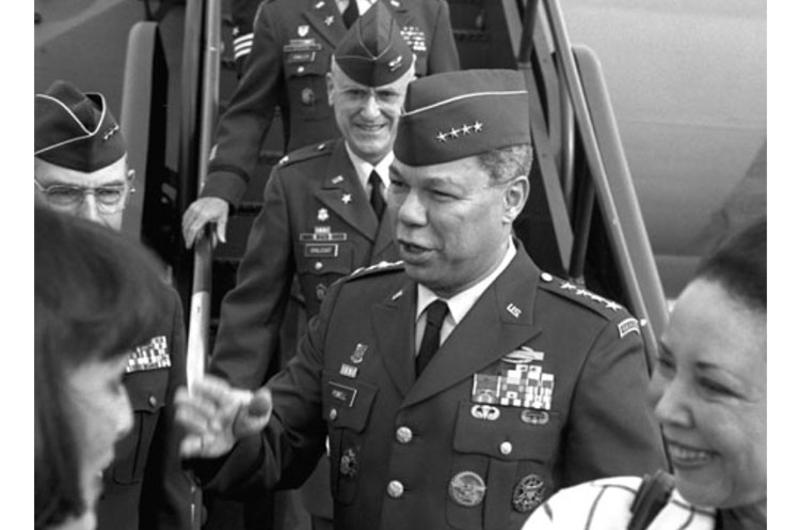Powell begins Far East visit

Gen. Colin Powell and his wife Alma, right, arrive at Yokota Air Base in Japan in November, 1991.
By Stars and Stripes staff and wire reports | November 19, 1991
YOKOTA AIR BASE — Gen. Colin Powell, chairman of the U. S. Joint Chiefs of Staff, arrived here on Sunday for three days of talks with Japanese leaders and visits to U.S. bases.
On Monday, Powell was scheduled to pay courtesy calls on Prime Minister Kiichi Miyazawa, Foreign Minister Michio Watanabe and Sohei Miyashita, the Defense Agency's director general. He also was to visit the Defense Agency to confer with his Japanese counterpart, Adm. Makoto Sakuma, chairman of the joint Staff Council of the Self-Defense Forces.
On Tuesday, after Powell visits Kadena Air Base on Okinawa, he will join U.S. Secretary of Defense Dick Cheney in South Korea where they will consult with their South Korean counterparts on security and military matters.
Powell will stay in South Korea until Friday when he will return to the States. Cheney will leave Friday for Japan for a two-day visit.
Joining Powell and Cheney in their Seoul meetings will be Adm. Charles Larson, commander in chief of the U.S. Pacific Command, and U.S. Ambassador Donald Gregg.
High on the agenda when the U.S. delegation meets with South Korean Defense Minister Lee Jong-koo and ROK Joint Chiefs of Staff Chairman Gen. Chung Ho-keun will be Pyongyang's suspected development of nuclear weapons.
While North Korea has consistently denied it is in the process of nuclear weapons development, South Korean and Western intelligence organizations say Pyongyang is nearing completion of a reactor and processing facility and will be capable of building nuclear devices in two years or less.
Some intelligence agencies say the North Koreans already have the capability to build the devices.
In a briefing for Korean reporters, Defense Minister Lee said he and Cheney would discuss measures short of military action that can be taken by Seoul and Washington to persuade Pyongyang to give up its nuclear program.
He said any international military action that might be taken should come through the United Nations and only after consultations with the South Korean government.
Other matters to be discussed include further withdrawals of U.S. troops from the peninsula, defense burden sharing and changes to the ROK-U.S. Combined Forces Command.
Some 7,000 of the about-40,000 U.S. troops in the country are to be withdrawn by the end of 1993 under a three-phase cutback plan. The two sides have discussed pulling out 6,000 to 7,000 more troops between 1993 and 1995.
South Korean officials and press reports from Washington over the past several weeks have said the second phase withdrawal will depend on North Korea's ending its nuclear weapons development program and agreeing to international inspection of its nuclear facilities.
Pyongyang has adamantly refused to allow the inspections until U.S. nuclear weapons it says are stored in the South are removed. It also wants international inspection of U.S. bases in the South.
Neither Washington nor Seoul will confirm or deny the existence of nuclear weapons in the South.
Seoul and Washington have agreed to increase South Korea's share of the estimated $2.62 billion cost of maintaining U.S. troops here to $180 million next year.
South Korea's share of the defense burden this year was $150 million.
The two countries also have agreed that a South Korean general will be named to head the Ground Component of the Combined Forces Command. The component now is headed by U.S. Gen. Robert W. RisCassi who also serves as the CFC's commander in chief.
During their trip to South Korea, Cheney will visit U.S. 2nd Infantry Division troops north of Seoul and Powell will visit U.S. and ROK troops in the joint Security Area at Panmunjom and at a South Korean outpost in the Demilitarized Zone.
Cheney and Lee also will sign a Wartime Host Nation Support agreement that sets down what logistics and other support South Korea will provide to U.S. forces sent here in the event of war.
This will be the 23rd Security Consultative Meeting and the 13th Military Committee Meeting between the two nations.



